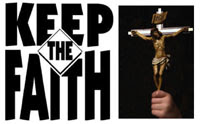Right To Know Must Trump Right To Choose
 Let’s face it, when we are making important decisions—crucial, life-changing decisions—what is it that we most desperately look for? Isn’t it everyday common-sense that we search out facts and information in order to make the best choice?
Let’s face it, when we are making important decisions—crucial, life-changing decisions—what is it that we most desperately look for? Isn’t it everyday common-sense that we search out facts and information in order to make the best choice? So let’s glance back at what we just said: A good choice is preceded by good information. What’s so difficult about such a concept?
The New Jersey Supreme Court this past week tried to debunk this common sense concept. Recent posts on this blog called their decision cowardly.
Richard Collier,
His article further exposes the ideological agenda of baby-killers, its pervasive influence and the shocking levels of society where it rules.
**********
LAST WEEK, the New Jersey Supreme Court decided that patients are not entitled to truthful answers when they ask doctors direct questions about medical procedures.
When Rosa Acuna learned she was six weeks to eight weeks pregnant, she asked if she was carrying a baby at that stage. Her doctor replied that her fetus was "not a living human being," but rather "just tissue at this time." As a result,
She suffered emotional distress upon discovering later that the abortion had indeed killed an existing human being. While expressing sympathy for
The court conceded that doctors must disclose all information that a reasonably prudent patient would find material before deciding to undergo a medical procedure. What could be more material than the one direct question the patient finds important enough to ask?
But according to the court,
This assertion is simply false.
As any basic biology textbook would show, human life is a continuum and the embryo is an independent, living human being from the instant of fertilization. But instead of consulting modern scientific texts, the court relied on the 1973 decision in Roe v. Wade to cast doubt on when human life begins.
Maybe the justices have not noticed, but science has advanced since 1973. That embryos are living human beings is no longer in doubt within the scientific community.
It is precisely for this reason that researchers demand stem cells be taken from embryos and not from laboratory rats. And even the U.S. Supreme Court now refers to the unborn being as "human life," as we saw in the partial-birth abortion decision five months ago. Arguments still rage over whether and when embryos can be killed, but these moral, philosophical and religious arguments presuppose the settled biological fact that embryos are living human beings.
And since when has an alleged lack of consensus in the medical community ever stopped a malpractice claim? Rare indeed is the malpractice case without opposing experts clashing on medical standards and medical facts. But such cases are submitted to juries every day. Why is
Are abortionists exempt from malpractice claims? No.
As the Supreme Court recently stated, "The law need not give abortion doctors unfettered choice in the course of their medical practice, nor should it elevate their status above other physicians in the medical community." Is medical consensus necessary before the law can take sides? No. The Supreme Court stated in April that "state and federal legislatures [have] wide discretion to pass legislation in areas where there is medical and scientific uncertainty. . . . Medical uncertainty does not foreclose the exercise of legislative power in the abortion context any more than it does in other contexts."
Maybe emotional distress claims are suspect? No.
Again, the U.S. Supreme Court recently stated: "Whether to have an abortion requires a difficult and painful moral decision. . . . [It] seems unexceptionable to conclude some women come to regret their choice to abort the infant life they once created and sustained. Severe depression and loss of esteem can follow."
Emotional consequences
Thus, even the Supreme Court recognizes the abortion decision is "so fraught with emotional consequences" that "[t]he State has an interest in ensuring so grave a choice is well informed."
So what is really going on in last week's
But in its misguided desperation to circle the wagons around the so-called right to choose abortion, the state Supreme Court has deprived women of their right to know what they are choosing -- even if they specifically ask.
No matter how you dress it up, last week's decision is anti-choice and anti-woman. The good news is that its blatant intellectual dishonesty will have the ironic effect of hastening the imminent and inevitable day when Roe is consigned to the ash heap of history.
One final observation: In perhaps its most laughable line, the court stated: "On the profound issue of when life begins, this court cannot drive public policy in one particular direction . . . when the opposing sides, which represent so many of our citizens, are arrayed along a deep societal and philosophical divide."
Editorial writers for The Record and elsewhere praised the court for its "wise judicial restraint." This is sheer nonsense. The same court has shown no restraint whatsoever in driving public policy on countless profound issues on which citizens are deeply divided, imposing its own agenda on same-sex marriage, school financing, zoning law, etc.
Judicial restraint is an alien notion in
Last week's decision is no exception.
Richard F. Collier Jr. practices law in Princeton and is president of the
Labels: abortion commentary, informed consent, twisted ideology


























0 Comments:
Post a Comment
<< Home